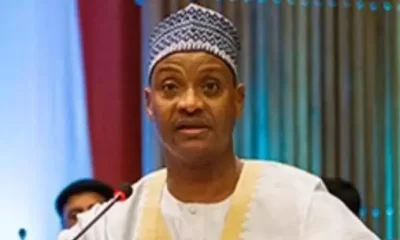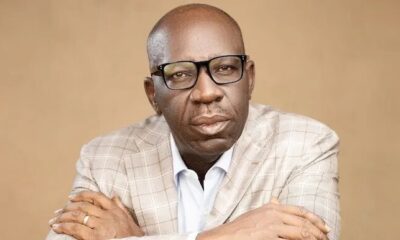Global Issues
Turkey’s Coup And The Five-finger Principle -By Ofem Uket

Islamic cleric, Fethulah Gulen, accused by President Recep Tayip Erdogan of Turkey of being responsible for the attempted coup in Turkey, has revealed that the government of that country already knows the masterminds of the aborted military coup which occurred last Friday.
The Islamic scholar, in a media statement, declared that it was a plot by the incumbent regime to further maximise its oppressive rule in Turkey and further undermine the rights of citizens..
In a rare and brief interview on Saturday with a small group of journalists at his residence in Saylorsburg, Pennsylvania, Gülen rejected all accusations that he was behind the coup attempt.
“I don’t believe that the world believes the accusations made by President Erdoğan. There is a possibility that it could be a staged coup and it could be meant for further accusations (against the Gülenists),” the cleric said.
Gülen, who leads from exile a popular movement called Hizmet and split from Erdoğan over a corruption scandal in 2013, spoke in a small prayer room, lined with woven rugs, decorated with Islamic calligraphy and leather-bound religious books. Reporters were served Turkish tea and sweet, dry figs at his Pennsylvania compound, which he moved into after arriving in the US in 1999.
He said he rejected all military interventions and said he had personally suffered after the coups of the 1990s. but hinted that he would have returned to Turkey if the coup had been successful.
Erdogan did hint, though, that he may reintroduce the death penalty, which the country abolished in 2004, as part of the conditions for joining the European Union.
European Commissioner Guenther Oettinger, said Erdogan would move Turkey away from the core values represented by the EU and the NATO defence alliance, of which Turkey has been a crucial member in the fight against ISIL, if he decided to use the attempted coup to restrict basic democratic rights further.
The commissioner said that if Erdogan remained adamant on this warning, he would strengthen his position domestically, but he would isolate himself internationally.
President Barack Obama said he was concerned by pictures showing the rough treatment of some of the arrested coup plotters, some of whom appeared stripped to their underwear and handcuffed behind the back.
But Erdogan is not backing down in insisting that the Islamic scholar is the brain behind the plot. So strong were his words that he did hint that Turkey would request an extradition order for Fethullah Gulen, so that he could stand trial in Ankara.
In no previous military coup or coup attempt in Turkey’s history has parliament been bombed by military helicopters and fighter jets.
Why did the coup attempt begin with blocking one side of Istanbul’s Bosporus Bridge? Why was the passage from the Asian side to Europe blocked while the passage from Europe to Asia was allowed to flow?
Why did the putschists — knowing that Erdogan was neither in Ankara nor Istanbul but instead spending his vacation in the Mediterranean seaside town of Marmaris — not move to detain him? They let him travel from Marmaris to the nearby Dalaman airport and then fly to Istanbul on a flight that took over an hour.
Why did the putschists not seize the main TV news channels and instead waste precious time taking over the least-watched state TV channel, TRT, allowing their targets to regroup and use more popular channels and social media effectively to challenge the coup attempt?
Prime Minister Binali Yildirim spoke first on the NTV channel, alleging that it was not a coup but a rebellion perpetrated by a small faction in the military. Erdogan then spoke through CNN-Turk via FaceTime and called on his supporters to take to the streets.
Seemingly a headless and disoriented coup attempt crumbled after a few hours, leaving 265 dead, some 1,440 wounded and at least 2,839 military personnel in custody.
The failed attempt left more questions behind rather than plausible answers as to who perpetrated it and why it was executed so sloppily and poorly.
Although the coup attempt foundered, the damages inflicted are grave. First, the reputation of Turkey as the bastion of stability in a volatile region where military takeovers are a relic of the past is over. The country’s image is tarnished, and nobody can assure impossibility of a coup or a coup attempt in the future.
Erdogan and Yildirim unhesitatingly pointed to Fethullah Gulen, a cleric and former ally who has lived in self-imposed exile in Pennsylvania for the last 18 years. The Turkish leaders implied that they would seek his extradition from Washington.
But, then, some fingers are pointing at Erdogan and, to boot, he must present evidence against Gulen.
It is a challenging task, indeed. It is not very convincing that key positions in the military of Turkey — a NATO force second only to the United States in terms of its numbers and believed to be a formidable institution — are controlled by an Islamic faction.
Over 40 generals are among some 3,000 putschists arrested. One of them is a four-star general who commands the second army responsible for the regions next to Syria and Iraq. Dozens of brigadiers and major generals commanding mainly combat troops of land forces, gendarmerie units fighting Kurdish insurgents, and combat units of the navy and air force can hardly be classified as Gulenists. Another four-star general — a commander of the third army — was also arrested yesterday. The first army commander, who is in charge of defending Istanbul and had declared his allegiance to the government on the night of the coup, asked Erdogan to come to Istanbul where his safety would be assured, thereby playing a decisive role in the collapse of the attempt.
So, before Erdogan can point the fingers at Gulen and others, but, he needs to be informed that the others fingers are pointing his way.
Uket, a social critic, wrote in from Abuja



















